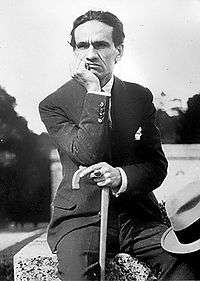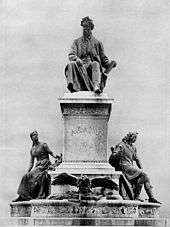National poet
A national poet or national bard is a poet held by tradition and popular acclaim to represent the identity, beliefs and principles of a particular national culture.[1] The national poet as culture hero is a long-standing symbol, to be distinguished from successive holders of a bureaucratically-appointed poet-laureate office. The idea and honoring of national poets emerged primarily during Romanticism, as a figure that helped consolidation of the nation states, as it provided validation of their ethno-linguistic groups.[1]
Most national poets are historic figures, though a few contemporary writers working in relatively new or revived national literatures are also considered "national poets." Some nations may have more than one national poet; the idea of a single one is always a simplification. It has been argued that a national poet "must write poetry that closely identifies with the nation's cause – or is thought to do so",[2] with an additional assumption being "that a national poet must write in a national language".[3]
The following is a list of nations, with their associated national poets. It is not a list of sovereign states or countries, though many of the nations listed may also be such. The terms "nation" (as cultural concept), "country" (as geographical concept) and "state" (as political concept) are not synonyms.
Africa
Asia
Europe
North America
Oceania
| Country | Poets |
|---|---|
| Henry Lawson, Adam Lindsay Gordon, Dorothea Mackellar, A. B. "Banjo" Paterson | |
| James K. Baxter, Allen Curnow |
South America
References
- 1 2 3 Nemoianu, Virgil (2002). Esterhammer, Angela, ed. "'National Poets’ in the Romantic Age: Emergence and Importance." Romantic Poetry. John Benjamins Publishing. p. 537. ISBN 9789027234506.
- ↑ John Neubauer, "Figures of National Poets", in Marcel Cornis-Pope and John Neubauer, eds., Figures of National Poets (2004), p. 11.
- ↑ Michael Baron, Language and Relationship in Wordsworth's Writing (1995), p. 13.
- ↑ J. Cameron; W. A. Dodd (17 May 2014). Society, Schools and Progress in Tanzania: The Commonwealth and International Library: Education and Educational Research. Elsevier Science. pp. 57–. ISBN 978-1-4831-5914-0.
- ↑ Morgenstierne, G. (1960). "Khushhal Khan—the national poet of the Afghans". Journal of the Royal Central Asian Society. 47: 49–57. doi:10.1080/03068376008731684.
- ↑ Aparna Chatterjee, Kaazi Nazrul Islam; The National Poet of Bangladesh : A Profile Study on The Literary Shelf, Boloji.com. Accessed 9 March 2007.
- ↑ Rabindranath Tagore
- ↑ Hristo Botev’s birth anniversary, Radio Bulgaria History and Religion, posted January 6, 2007, updated on January 12, 2007, accessed 9 March 2007
- ↑ Michael Dobson (17 November 1994), The Making of the National Poet - Shakespeare, Adaptation and Authorship, 1660-1769, Clarendon Press, ISBN 978-0-19-818323-5
- ↑ Balazsr2=Michal Kopecek (1 November 2006). National Romanticism: The Formation of National Movements. Central European University Press. p. 431. ISBN 978-963-7326-60-8.
Characteristically, although Njegoš saw himself as a definitely Serbian poet, his epic came to be later canonized as the most important work of 'Yugoslav' literature [...]
- ↑ Daniel Balderston, Mike (2004). Encyclopedia of Latin American and Caribbean Literature, 1900-2003. Routledge. p. 666. ISBN 0-415-30687-6.
- ↑ James Woodall, Borges: A Life, Basic Books (1996). ISBN 0-465-04361-5. Relevant excerpt available on the New York Times web site, accessed 9 March 2007.
Further reading
- Marcel Cornis-Pope and John Neubauer, eds., Figures of National Poets (2004)
- Edward Whitley, American Bards: Walt Whitman and Other Unlikely Candidates for National Poet (2010)
- Michael Dobson, The Making of the National Poet (1992)
- Josep R. Llobera, Foundations of National Identity (2004)


.jpg)
.jpg)



.jpg)






